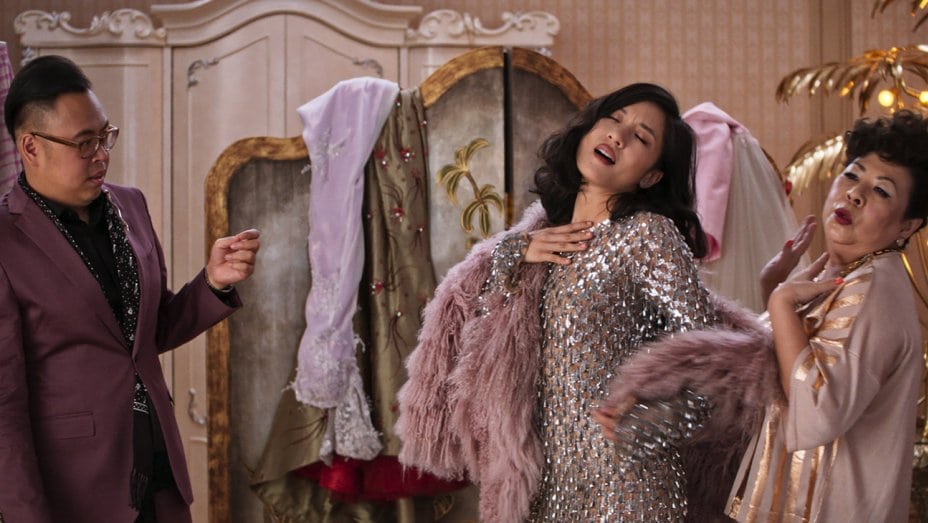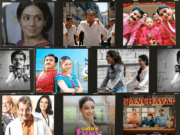
See? With Crazy Rich Asians and Black Panther: Hey Hollywood, We Told You Diversity Was A Good Thing!
Lifestyle Oct 01, 2018
With the global success of Crazy Rich Asians and Black Panther, Hollywood is realizing that that diversity does indeed mean box office success. Busting the (incorrect) historical movie making myth of “that doesn’t sell” our time has finally come. So here’s our “we told you” chant: Hey Hollywood, we told you diversity was a good thing!
Diversity Vs. Hollywood:
Filmmaking is supposed to be a way for an artist to express themselves. And, in my eyes, an artist is supposed to be creative and push the boundaries of their art.
In Hollywood though, despite the immense amount of ingenuity that goes into creating blockbuster hits, fewer liberties are taken within the film industry when it comes to diversity. According to a study, “Inequality in 1,100 Popular Films,” conducted by Dr. Stacy L. Smith’s think tank, USC Annenberg Inclusion Initiative, between 2007 and 2017, “Hollywood is still so white.”

You might want to get a paper bag to breathe into and sit down for this one: based on the USC Annenberg Inclusion Initiative’s report of the top-rated films in 2017, the percentage of characters was as follows: “white – 70.7%, black 12.1%, Hispanic – 6.2%, Asian – 6.3%, and Other – 4.8%.” Meanwhile, between 2007 and 2017 diversity behind the camera did not fare much better as, among “1,100 films and 1,233 directions” there only “5.2% or 64 were black or African American (60 male and 4 female) [and] “3.1% or 38 were Asian or Asian American (35 male and 3 female).
#OscarSoWhite:
With stats like that, the unrest and lack of racialized representation within the industry was bound to bubble up to the surface, and it did with the #OscarSoWhite movement. While I’m certain there were already active conversations about the lack of diversity within the film industry, the #OscarSoWhite hashtag, coined by April Reign in 2016, called out the Academy Awards for a roster of primarily white nominees. Then, in 2017, the Academy didn’t seem to learn their lesson and there was a repeat of white nominees. And so, according to the New Yorker, they rushed to conduct an “an ambitious membership overhaul to diversify the voting body by race, gender, geography, and age. [As a result], in 2017…the Academy invited nearly eight hundred new members—thirty-nine per cent female and thirty per cent non-white—among them.” Even still, the New Yorker reports, today, “the voters [that make up the Academy] are still predominantly white and male; twenty-eight per cent are female, and only thirteen per cent are non-white.”

I’m sure you’re wondering why this is important to talk about.
According to the Huffington Post, #OscarSoWhite blew the lid off on a crucial topic and resulted in a “movement fighting for fair representation and recognition of people of color.” Reign explained that, the Huffington Post reported, ““It’s not about saying who is snubbed and who should have been nominated, it’s about opening the discussion more on how the decisions were made, who was cast and who tells the story behind the camera.”
How Is Representation In Film Changing The Game?
In 2018, the film industry experienced two major doses of diversity with Black Panther (which I’ve fondly renamed #WakandaForever) that featured a primarily black cast and a black director, Ryan Coogler, and Crazy Rich Asians, which showcased an Asian cast and director, Jon Chu.
These movies were major wins for so many reasons, but let’s take a closer look at each one to really unpack it:
Black Panther:

The thing is, for the most part, Caucasians are highly represented in media and so this population is able to frequently see themselves in a variety of roles, which illustrates that the culture is not limiting. However, for minority groups, according to Time Magazine, it is more difficult to see reflections of themselves “…in mass media and other arenas of public life, [or even] find representation that indicates that [the] humanity [of minorities are] multifaceted.” For many people, Time Magazine notes, it is important to be able to “relat[e] to characters onscreen…not merely for us to feel seen and understood, but also for others who need to see and understand us. When it doesn’t happen, we are all the poorer for it.”
This is why, Time Magazine reports, Black Panther is so fabulous and revolutionary in its own right as it tackles “…what it means to be black in both America and Africa—and, more broadly, in the world.”
In addition, although there have been other “…black superheroes – Blade, Cleopatra Jones, Luke Cage, X-Men’s Storm” the Black Panther is different as they are in a leading role, rather than as a support or stereotypical sidekick. As well, the film celebrates female heroines in the film and awards them with crucial jobs, such as having “…the Dora Milaje, the all-female personal guards of the Black Panther.” These women are literally responsible for the keeping the kingdom safe (#nobigdeal). Meanwhile, there is also a reflection of innovative and independent women, which challenges typical gender roles, such as with Nakia (Lupita Nyong’o), who fiercely fights tradition and Shuri (Letitia Wright) who is a wicked awesome scientist.
Crazy Rich Asians:

The movie, according to Insider, is relatable as it brings to life a variety “…of Asian-American characters as all types of human beings” as opposed to the typical depictions that surely result in some eye rolls. Of course, the onscreen illustrations of the characters are of the crazy rich, however, the audience is still able to find characters and narratives they are able to find a connection with, such as when the family sits down to make dumplings together, the music, and the WeChat scene.
As well, reports Insider, the movie explores what many Asian-Americans go through: “…the sinking feeling that we aren’t [insert specific Asian community here] enough for other Asians.” It’s a murky subject that is likely often brushed under the rug, but the movie attacks it head-on, which can be empowering for those who are going through it right now.
If that wasn’t enough, the immense success of Crazy Rich Asians has also resulted in the greenlighting of other Asian-led ventures.
Bend It Like Beckham:
I cannot talk about diversity without mentioning a movie that truly resonated with me while growing up: Bend It Like Beckham (2002). For me, this movie was radical because it tackled diversity, racism, gender stereotypes, and how being stuck between two cultures can impact a person (which I can totally relate to).
This iconic film, which was not a Bollywood production, gave us Jesminder Bhamra aka Jess (Parminder Nagra), a South Asian leading lady (yes, for real).
Bend It Like Beckham was filled with a multi-racial cast and even featured a budding interracial relationship between Jess and her coach, Joe (Jonathan Rhys Meyers). I relished the fact that Jess was determined to push the boundaries of both cultural expectations and gender stereotypes to pursue her passion – football (soccer for North Americans). She was far less concerned with making round chapati’s (a grave concern for her mother) and what type of family that would allow her to marry into, and was instead more focused on her dreams.
This did not sit well with her family at first, as she struggled between two cultures (the traditional Punjabi norms her family had instilled in her and her own, which I believe were a blended product of her home life and more ‘Western’ beliefs due to her upbringing in London). I know firsthand that being bi-cultural is difficult to navigate, but at some point, you have to choose to live the life that will make you happiest, and that’s just what she bravely did.

The film also touched on the discrimination that still exists within cultures everywhere, including homophobia. For example, Jess’s best friend, Tony (Ameet Chana), was in the closet and she herself was accused of being a lesbian – what was interesting is that her family responded by saying “Jess is a Pisces” as though the word ‘lesbian’ wasn’t even in their vocabulary. As well, the movie touched on racism within sports, which is why Jess’s dad (Anupam Kher) was hesitant to let his daughter play football as he didn’t want her to face the same hurtful limitations he had.
Let’s Recap:
What’s exciting for me about these movies is being able to see communities band together in solidarity to show their support for films that they feel a part of. They are so genuinely excited to see themselves and their cultures being reflected on the big screen as they are able to finally identify with these narratives and characters. More than that though, we are living during a time in which inclusivity is more mainstream (why it hasn’t always been is a question for another day) and these movies are paving the way for more conversations to be had.
What We Need To Do Next:
Moving forward, although the film reels of Hollywood seem to spin slower, the response of the public to movies like Crazy Rich Asians, Black Panther, and Bend It Like Beckham demonstrate the need for increased representation of people of colour in film. Stars within the industry are speaking up about it too, such as Frances McDormand, who at the end of her Oscar speech in 2018, said: “I have two words for you: inclusion rider.”
The Guardian explains that an ‘inclusion rider’ is a stipulation that “…actor can insist be inserted in their contract that requires cast and crew on a film to meet a certain level of diversity.” This clause, as reported by The Guardian, according to Dr. Smith’s think tank, Annenberg Inclusion Initiative, notes could certainly help to tackle the fact that “…casting [is often] not representative [of] the demography…where the story is taking place.” With this in mind, Warner Bros (along with sister companies HBO and Turner) is working toward introducing a strategy “…to increase diversity on and off screen.” This push for inclusivity, according to The Guardian, “will begin with Just Mercy, a film starring Michael B. Jordan, who was one of the first actors to commit to the idea.”

That said, it will be interesting to see how Hollywood changes over the next few years as there is more light shed on the outdated and hushed traditions of the film industry. More so, it will be fascinating to see how those changes transcend and shape other industries.
Main Image Photo Credit: www.alumni.harvard.edu
Devika Goberdhan | Features Editor - Fashion
Author
Devika (@goberdhan.devika) is an MA graduate who specialized in Political Science at York University. Her passion and research throughout her graduate studies pushed her to learn about and unpack hot button issues. Thus, since starting at ANOKHI in 2016, she has written extensively about many challe...













































































































